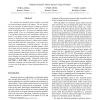112
Voted
LICS
2009
IEEE
15 years 9 months ago
2009
IEEE
Abstract. Ludics is peculiar in the panorama of game semantics: we first have the definition of interaction-composition and then we have semantical types, as a set of strategies ...
122
click to vote
LICS
2009
IEEE
15 years 9 months ago
2009
IEEE
The search for an expressive calculus of datatypes in which canonical algorithms can be easily written and proven correct has proved to be an enduring challenge to the theoretical ...
146
Voted
LICS
2009
IEEE
15 years 9 months ago
2009
IEEE
Weighted automata are nondeterministic automata with numerical weights on transitions. They can define quantitative languages L that assign to each word w a real number L(w). In ...
128
click to vote
LICS
2009
IEEE
15 years 9 months ago
2009
IEEE
Pointer programs are a model of structured computation within logspace. They capture the common description of logspace algorithms as programs that take as input some structured d...
LICS
2009
IEEE
15 years 9 months ago
2009
IEEE
115
Voted
LICS
2009
IEEE
15 years 9 months ago
2009
IEEE
In this paper we introduce “clipping,” a new method of syntactic approximation which is motivated by and works in conjunction with a sound and decidable denotational model for...
110
click to vote
LICS
2009
IEEE
15 years 9 months ago
2009
IEEE
We consider the standard model of finite two-person zero-sum stochastic games with signals. We are interested in the existence of almost-surely winning or positively winning stra...
100
Voted
LICS
2009
IEEE
15 years 9 months ago
2009
IEEE
—One-counter processes are pushdown systems over a singleton stack alphabet (plus a stack-bottom symbol). We study the complexity of two closely related verification problems ov...
152
click to vote
LICS
2009
IEEE
15 years 9 months ago
2009
IEEE
Game semantics describe the interactive behavior of proofs by interpreting formulas as games on which proofs induce strategies. Such a semantics is introduced here for capturing d...
127
click to vote
LICS
2009
IEEE
15 years 9 months ago
2009
IEEE
A psi-calculus is an extension of the pi-calculus with nominal data types for data structures and for logical assertions representing facts about data. These can be transmitted be...

